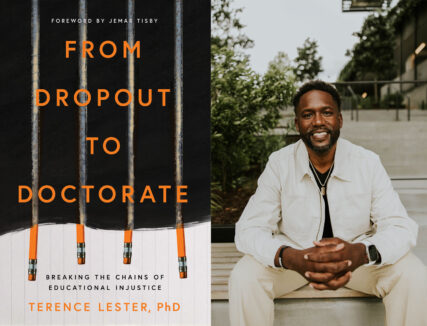(RNS) — Terence Lester, wearing a black hoodie and a beanie, sat atop a tall, black curbside refrigerator in the Atlanta suburb of College Park, Georgia, on a sunny Tuesday afternoon in November in hopes of bringing attention to the 42 million Americans who rely on SNAP benefits.
The empty fridge is symbolic of the deprivation and hunger of those impacted by the steep cuts to the Supplemental Nutrition Assistance Program, the United States’ largest food aid program. Lester, an ordained minister and founder of the nonprofit Love Beyond Walls, said the organization has received more than 1,000 calls in the past month requesting food assistance. As a person of faith, he sees politicians’ apathy toward impoverished communities as deeply unethical.
“Most people who make decisions politically are not necessarily proximate to the community, and the distance between policy and community creates the stigma and the exclusionary practices that we see,” Lester told RNS in a video call from the top of the refrigerator. “No solution that we’ve ever created has come without us being proximate to people. That is at the core of how Jesus showed up.”
Raised by a single mom who juggled several jobs to put food on the table, Lester, 42, is intimately familiar with what it means to be proximate to those who have less. Love Beyond Walls distributes monthly donated food and hygiene products to up to 700 families, installs self-sustaining shower units and handwashing stations for unhoused folks and offers counseling, health screenings and laundry services to underserved individuals.
He hopes this fridge campaign will attract donations for students in need at Title I schools who are being impacted by the SNAP cutbacks. He’s clear that this is an issue everyone should be concerned about. “We live in a moment right now where any single person is one medical experience away from impoverishment, one tragic loss away from impoverishment, one loss of a job away from impoverishment,” he said.
An “ecumenical leader” who has worked in both mainline Protestant and Black church congregations, Lester, who has a doctorate in public policy and social change, describes in his new book, “From Dropout to Doctorate: Breaking the Chains of Educational Injustice,” how he struggled in school to shift from his home life’s survival mode into learning mode in classrooms disconnected from his daily reality.
Those struggles made him susceptible to local gang culture, he said. Being part of a gang only exacerbated his academic challenges. Then, tensions at home led to bouts of living on the streets. At age 20, he was arrested, but during his brief stint in jail, another man who had been detained told Lester about his faith in God. The next morning, a judge dismissed his case, he writes in his book. Lester got involved in the church, a decision that laid the foundation for his current justice-oriented nonprofit work.
“One of the first things that Jesus says in Luke 4 is that he comes to give good news to the poor,” said Lester, referring to the gospel. “He was born into impoverishment himself. And so he understands this world.”

Author Terence Lester and his book “From Dropout to Doctorate.” Portrait by Dani Guerra/Images courtesy Lester
Lester said he hesitates to call himself a Christian given the ways the term has been “hijacked” by conservatives who, among other things, hold that empathy subverts both justice and biblical truth. He said conservative solutions to poverty and hunger ignore a truth he summarizes as: “If you teach a man how to fish and you don’t feed him anything, then he’ll pass out before he learned anything.”
Long-term solutions to social problems require deeper questions about the factors that contribute to poverty. The answers, he said, arise from living with those experiencing poverty directly. “It’s not just asking, ‘How can I help?’ but trying to understand, ‘why does this keep hurting?’ ‘Why does this keep causing harm?’” said Lester. “It’s not just passing out a sandwich, but it’s understanding, ‘Why do we live in a food desert in the first place?’”
Asked why he believes the government is responsible for feeding the hungry, Lester said, “It’s everybody’s responsibility.” He added that no individual is self-made; all benefit from the sacrifice, labor and support of their community, and from those who came before. Churches, nonprofits, individuals and governments can all contribute to the wellbeing of others. In the end, he said, “what I do for my neighbor, I’m also doing for myself for the benefit of the whole.”
As the SNAP cuts and delays caused by the federal government shutdown impact millions of Americans, Lester said, the disadvantaged will face challenges even when the impasse in Congress is solved and expanded SNAP work requirements passed under the One Big Beautiful Bill take effect. The unhoused will no longer be exempt from SNAP work, training or volunteer requirements and may lose benefits after three months. Lester pointed out this is a particular challenge for those who lack access to transportation.
Donations collected during Lester’s fridge campaign will go toward the Love Without Borders Zion’s Closets initiative, which repurposes classrooms in Title I schools into resource closets filled with essential items for students facing poverty and homelessness. He hopes doing so will remind people of the real-life, on-the-ground implications of SNAP reductions.
“Use your voice, even if you can’t contribute or donate monetarily or in the form of tangible goods,” said Lester. “Enough is enough. We need more compassion.”



